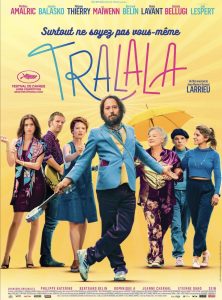17 April 2023 by bobhud
Review of Jean-Marie and Arnaud Larrieu’s musical comedy Tralala
2021, Arte France Cinéma/SBS/Canal+/CNC, 120 min
Bob Hudson
Brigham Young University
Imagine a world in which late-career Jacques Demy meets The Return of Martin Guerre amid the colorful palette and throngs of believers flocking to Lourdes. This is the cinematic universe to which Jean-Marie and Arnaud Larrieu, two brothers originally from the Hautes-Pyrénées, brought us in their 2021 musical comedy Tralala. Returning to the cinema following a six-year hiatus (their most recent previous film was the 2015 intellectual sex comedy Vignt et une nuits avec Pattie, which had no shortage of star power, including Karin Viard, Isabelle Carré, Denis Lavant and André Dussollier), the brothers won a national contest launched by the CNC (Centre national du cinema et de l’image animée) and chaired by Christophe Honoré to finance a new French musical comedy. The result was a rare explosion of color and joy in a year otherwise marred by the Covid-19 pandemic.
Not only did the Larrieu brothers return in 2021, the film’s star Mathieu Amalric likewise reappeared on the screen in lead acting role after having won the Prix Louis-Delluc in 2017 as the director for Barbara (in which he also acted) and having played a key role in an episode of the quirky Wes Anderson anthology comedy The French Dispatch (2021).
Amalric, as the eponymous “Tralala,” opens the film as a shaggy homeless street musician – that the actor said in interviews gave him the appearance of a blend of Jesus and Jim Morrison – squatting in a condemned building without running water or electricity. Despite these squalid conditions, he still has a battered electric guitar, an amp and a smart phone that a friend, Babak, he has made on the demolition site – which his now his neighborhood – charges for him daily. Playing his guitar and singing in Montparnasse, between the train station and the tower, Tralala encounters a vision, a young girl “too beautiful to be real” (Galatéa Bellugi). Part Our Lady of Consolation, part Saint Bernadette, the Marian figure, which he will call the “Girl in Blue” bids him follow her through the empty market stalls on Edgar Quinet, buys him a drink at a Rue de la Gaîté terrace bar, and then disappears after having paid the tab – but leaving behind clues that will drive the rest of the film: a cigarette lighter marked “Lourdes” with an image of the Virgin appearing to Bernadette, enough change from the drinks she covered to pay his train fare to Lourdes and the piece of advice that would become the motto of his quest: “Surtout, ne soyez pas vous-même” [Above all else, don’t be yourself].
Arriving in Lourdes, the colors and scenery change instantly, and the southwestern town takes on the stylized coloration of Demy’s Rochefort. Setting out to find the apparition, Tralala draws her likeness on a cardboard bar coaster along with her motto and heads into the city. Relating this near religious experience in song to tourists, he angers a local tin-flute playing busker named “Climby” (the extremely versatile Denis Lavant), who throws his guitar into the Ousse River. Purchasing a gift store Lourdes banjo, Tralala continues on his quest – and here is where the film takes its turns. Finding himself in turn mistakenly identified as a grieving mother’s (Josiane Balasko) long lost son Pat, who left for America and never returned, in the lover’s triangle Pat left behind (between Mélanie Thierry and Maïwenn) and before Pat’s skeptical brother Seb (Bertrand Belin) and his sons at a lakeside bar, Tralala learns that the consolation the “Girl in Blue” offers is not for his own destiny but for these individuals in mourning or personal limbo after Pat’s disappearance. Being a musical, this evolution is sung throughout, with some thirty original songs driving the narrative forward.
Highlights in the musical offerings are the “Electron libre” song with which Tralala begins, the song of a goodhearted Italian priest who befriends Tralala singing his “Jesus Christ my Love,” a dance number and song by Mélanie Thierry’s “Jeannie” in a saturated, electric blue Lourdes gift shop, Maïwenn’s Barbara’s “Chambre 617” and the cynical brother but talented musician Seb’s “D’entre les morts.” While I assumed I might typically despise the introduction of rap into a musical by Seb’s sons Robin and Balthazar, the two characters are so sincere and likeable that their performance actually works (even if this sincerity somewhat betrays Poe’s law of satire). This film was exactly the type of gripping confection the world needed in 2021, after 18 months of confinement.
One element that marks the film as coming from the era of the pandemic was the presence of masks on characters throughout the film, leaving Montparnasse, serving at bars, in gift shops in Lourdes, everywhere. In fact, I originally watched the film, masked, in a ciné club in Montparnasse. Watching it again 18 months later on DVD, with the pandemic winding down and masks no longer required in most public places, it dawned on me just how much this is a pandemic film – one of the very best I have seen to capture that historic moment on film.
Screened originally at Cannes in May 2021 as an hors compétition midnight offering, following its French run in the box office in Fall 2022, Tralala has no North American distribution at present. A DVD by Pyramide Vidéo was released in France in February 2022 in PAL/Region 2 format but with English subtitles.
As both a pandemic film and a musical comedy that hits all of the right notes, with an impressive ensemble cast with great chemistry, Tralala is absolute delight that once again poses the ethical questions of Martin Guerre and Hollywood film The Majestic (2001) – namely, is it okay to eschew your own subjectivity in the name of offering solace to another? And, if you are one of those that dismisses musical comedies wholesale, take the advice of the “Girl in Blue”: “Surtout, ne soyez pas vous-même.”


Leave a Reply
You must be logged in to post a comment.